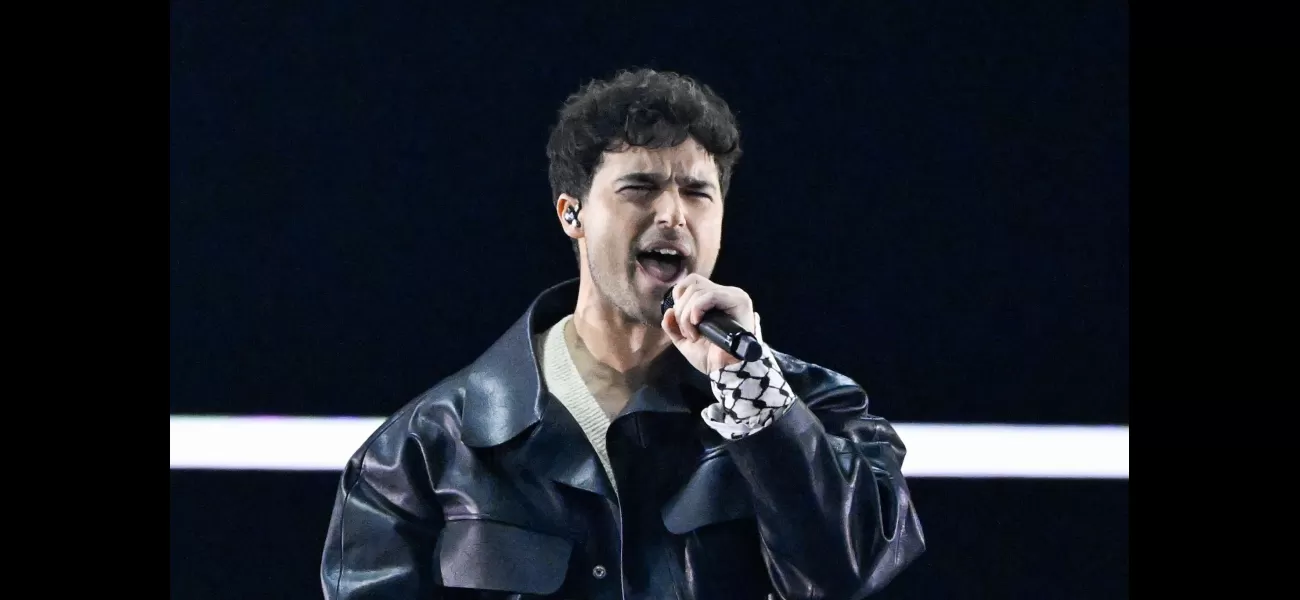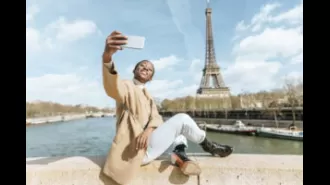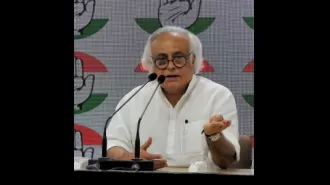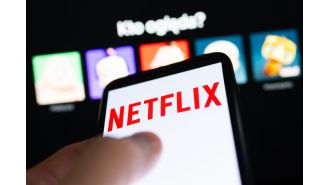Eurovision organizers express remorse for artist displaying pro-Palestinian emblem.
The performer's actions went against the event's non-political stance.
May 7th 2024.

The organizers of Eurovision expressed their disappointment after one of the performers in tonight's semi-final was seen wearing a pro-Palestinian symbol. The first semi-final of the highly-anticipated 2024 competition took place in Malmö, Sweden, with a star-studded lineup including Bambie Thug from Ireland, Olly Alexander representing the UK, and Marcus & Martinus from Sweden captivating the audience with their stunning performances.
Among the performers was former Swedish contestant Eric Saade, who sang his hit song "Popular" from 2011 as part of the opening act. However, his choice to wear a keffiyeh, a traditional Palestinian scarf, on his arm sparked controversy and raised questions about the political neutrality of the event. The Eurovision Song Contest has always been described as a non-political event, and the European Broadcasting Union, who oversees the competition, released a statement expressing their regret over Saade's decision, stating that all performers are made aware of the rules and guidelines of the contest.
Despite this incident, the show went on with dazzling performances and exciting moments, including behind-the-scenes gossip and drama that was shared among fans in a special WhatsApp group. The group also hosted polls for viewers to vote for their favorite acts, adding to the excitement and anticipation of finding out who will be crowned the winner of Eurovision 2024.
Before the event, attendees were subjected to rigorous security checks and were advised not to bring any Palestinian flags, symbols, or bags with them. This was a precautionary measure in response to calls for a boycott of the competition due to the ongoing conflict between Israel and Hamas. The war, which began in October 2023, has resulted in numerous casualties and has sparked heated debates over the inclusion of Israel's performer, Eden Golan, in Eurovision.
In light of these events, the Eurovision Song Contest has reiterated its stance as a non-political event that brings people together through the universal language of music. The organizers also stated their support for freedom of speech and the right to peaceful demonstrations, as some protests were expected to take place during the competition.
The first semi-final aired on Tuesday, May 7, and the second on Thursday, May 9, with the Grand Final taking place on Saturday, May 11. Fans around the world tuned in to see their favorite acts compete for the coveted title. As the competition came to a close, Eurovision reminded viewers that it is not just a music competition, but a celebration of unity and diversity.
If you have any celebrity stories, videos, or pictures to share, you can reach out to the entertainment team at The Agency by email, phone, or through their website. The team is always eager to hear from you and share your stories with the world.
Among the performers was former Swedish contestant Eric Saade, who sang his hit song "Popular" from 2011 as part of the opening act. However, his choice to wear a keffiyeh, a traditional Palestinian scarf, on his arm sparked controversy and raised questions about the political neutrality of the event. The Eurovision Song Contest has always been described as a non-political event, and the European Broadcasting Union, who oversees the competition, released a statement expressing their regret over Saade's decision, stating that all performers are made aware of the rules and guidelines of the contest.
Despite this incident, the show went on with dazzling performances and exciting moments, including behind-the-scenes gossip and drama that was shared among fans in a special WhatsApp group. The group also hosted polls for viewers to vote for their favorite acts, adding to the excitement and anticipation of finding out who will be crowned the winner of Eurovision 2024.
Before the event, attendees were subjected to rigorous security checks and were advised not to bring any Palestinian flags, symbols, or bags with them. This was a precautionary measure in response to calls for a boycott of the competition due to the ongoing conflict between Israel and Hamas. The war, which began in October 2023, has resulted in numerous casualties and has sparked heated debates over the inclusion of Israel's performer, Eden Golan, in Eurovision.
In light of these events, the Eurovision Song Contest has reiterated its stance as a non-political event that brings people together through the universal language of music. The organizers also stated their support for freedom of speech and the right to peaceful demonstrations, as some protests were expected to take place during the competition.
The first semi-final aired on Tuesday, May 7, and the second on Thursday, May 9, with the Grand Final taking place on Saturday, May 11. Fans around the world tuned in to see their favorite acts compete for the coveted title. As the competition came to a close, Eurovision reminded viewers that it is not just a music competition, but a celebration of unity and diversity.
If you have any celebrity stories, videos, or pictures to share, you can reach out to the entertainment team at The Agency by email, phone, or through their website. The team is always eager to hear from you and share your stories with the world.
[This article has been trending online recently and has been generated with AI. Your feed is customized.]
[Generative AI is experimental.]
0
0
Submit Comment





